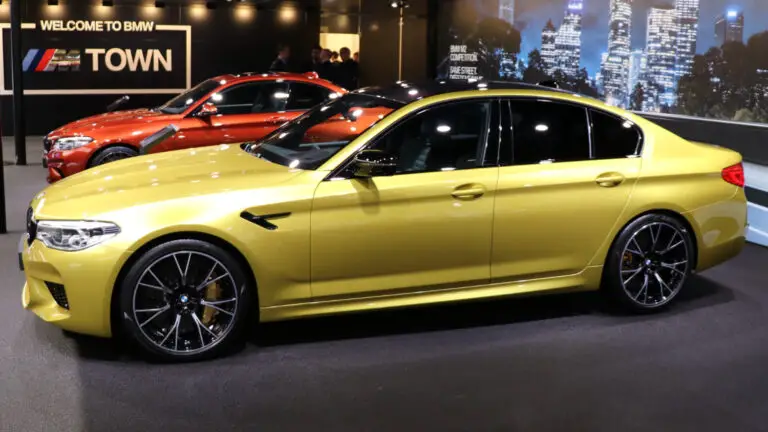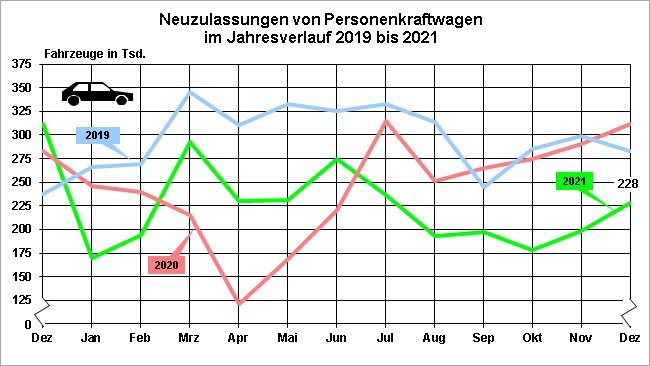In 2021, new passenger vehicle registrations in Germany decreased by another 10% — market analysis shows the German car market at its smallest in years.

In full-year 2021, the German new car market contracted by 10.1% to 2,622,132 passenger cars (PKW) — the lowest total of new passenger vehicle registrations in Germany in a calendar year for decades. Sales of heavy commercial trucks improved but sales of light commercial vehicles and motorcycle sales were weaker. Sales of electric cars increased to double market share to 13.6% of the German new car market while only a fifth of all new cars used diesel. Volkswagen was again the top-selling brand in Germany in 2021, the VW Golf the favorite car model despite production issues, and the Tesla Model 3 the best-selling electric car model.
German Car Sales Statistics — 2022: Market Overview, Brands, Models, Electric; 2021: Market, Brands, Models, Electric; 2020: Market, Brands, Models, Electric; 2019: Market, Brands, Models, Electric
German New Motorized Vehicle Market in 2021 (Full Year)
In 2021, total new motorized vehicle registrations in Germany contracted by 8.7% to 3,233,891 vehicles (Kraftfahrzeuge) — more than 200,000 fewer than in 2020 and almost a million fewer vehicles than in 2019. Passenger cars (PKW) are by far the largest component of this total and hit hard by a 10.1% decline in registrations.
Commercial vehicles performed generally better with sales of light commercial vehicles only marginally weaker while heavy commercial vehicle sales increased.
According to the KBA, the composition of the new motorized vehicle market in Germany in 2021 was as follows:
| Vehicle Category | Fahrzeugklasse | FY2021 | FY2020 | % 21/20 |
| Motor Cycles | Krafträder | 200,231 | 221,994 | -9.8 |
| Cars (PKW) | Personenkraftwagen | 2,622,132 | 2,917,678 | -10.1 |
| Buses | Kraftomnibusse | 6,474 | 6,460 | +0.2 |
| Trucks (Lorries / LKW) | Lastkraftwagen | 293,359 | 295,166 | -0.6 |
| Tractor Units | Zugmaschinen insgesamt | 90,039 | 79,646 | +13.0 |
| – of which Semi-Trailer | – dar. Sattelzugmaschinen | 29,698 | 25,946 | +14.5 |
| Other motorized vehicles | Sonstige Kraftfahrzeuge | 21,656 | 21,499 | +0.7 |
| All Motorized Vehicles | Kraftfahrzeuge zusammen | 3,233,891 | 3,542,443 | -8.7 |
| Trailers | Kraftfahrzeuganhänger | 341,544 | 335,296 | +1.9 |
| Source: KBA |
German Car Production and Exports in 2021
Car production in Germany in 2021 fell by 12% to only 3.1 million — the lowest number since 1975. Supply shortages, rather than demand, were the main brake on German car production, as was the case worldwide.
According to the VDA, car exports from Germany were down 10% to only 2.4 million vehicles exported in 2021.
New Passenger Car Sales in Germany by Month in 2021
The German new passenger car market was mostly negative throughout 2021, except for the few months that corresponded with the heaviest declines in 2020 when much of Germany was in Covid lockdown. However, a lack of computer chips and other supply chain issues led to heavy shortages in cars and lower sales each month of the second half of the year. Car sales in Germany in 2021 were far weaker each month of the year compared to 2019 when the German new car market was near record highs.
New passenger vehicle registrations in Germany per month were as follows during the past three years:

New Car Sales in Germany by Year (2007-2021)
New passenger vehicle registrations in Germany in the full calendar year 2021 contracted by 10.1% to 2,622,132 cars — almost a million fewer cars than in 2019. This was the lowest total for the German new car market since re-unification in 1990 and the lowest since 1985 if only the West German market is counted. It was the second consecutive year that the German new car market was smaller than three million vehicles.
New passenger vehicle registrations in Germany by year since 2007 were as follows:
| Year | German Car Sales | % Change |
| 2021 | 2,622,132 | -10.1 |
| 2020 | 2,917,678 | -19.1 |
| 2019 | 3,607,258 | 5 |
| 2018 | 3,435,778 | -0.2 |
| 2017 | 3,441,262 | 2.7 |
| 2016 | 3,351,607 | 4.5 |
| 2015 | 3,206,042 | 5.6 |
| 2014 | 3,036,773 | 2.9 |
| 2013 | 2,952,431 | -4.2 |
| 2012 | 3,082,504 | -2.2 |
| 2011 | 3,173,634 | 9 |
| 2010 | 2,916,260 | -23.4 |
| 2009 | 3,807,175 | 23.2 |
| 2008 | 3,090,040 | -1.8 |
| 2007 | 3,148,163 | -9.2 |
| Source: KBA |
German Passenger Car Market in 2021 (Full Year)
In 2021, the popularity of both petrol and diesel-engined cars declined further in Germany. Petrol (excluding hybrids) remained by far the largest component of new cars but the market share slipped to 37.1% compared to 46.7% in 2020, 59.2% in 2019, and 62.4% in 2018. The market share for diesel was down to 20.1% (previous years 28.1%, 32%, and 32.3%).
Hybrid cars took a market share of 28.8% in 2021 compared to 18.1% in 2020 and 6.6% in 2019 with 754,588 (+43%) hybrid car registrations in Germany for the first time in 2021. This number included 325,449 (+62.3%) plug-in hybrids for a market share of 12.4%.
Registrations of battery-electric cars increased by 83.3% to 355,961 electric cars in 2021. In 2020, sales of electric cars in Germany more than tripled (+207%) but despite slower growth in 2021, the share of battery-electric cars of the German new car market doubled from 6.7% in 2020 to 13.6% in 2021. In 2019, electric cars had a market share of only 1.8% in Germany.
Average CO2-Emissions of new cars sold in Germany in 2021 were down 15.1% to 118.7 g/km (139.8 g/km in 2020 and 157.0 g/km in 2019). (Methodology was different in 2019, so the figures are not directly comparable.)
The most popular car colors in Germany in 2021 remained grey (including silver) at 29.8%, black (24.7%), and white (21.5%).
German Car Sales by Market Segment in 2021
The most important market sectors for German new car sales in 2021 were:
- 25.4% SUV, e.g. VW T-Roc
- 17.5% compact, e.g. VW Golf
- 14.3% small, e.g. VW Polo
- 10.7% Geländewagen / Cross-Country, e.g. VW Tiguan
- 10.3% middle class, e.g. VW Passat
Volkswagen was again the top-selling brand in Germany in 2021, VW Golf the favorite car model, and the Tesla Model 3 the best-selling electric car model.
German Car Sales Statistics — 2021: Market Overview, Brands, Models, Electric; 2020: Market Overview, Brands, Models, Electric Cars; 2019: Market Overview, Brands, Models, Electric Cars
